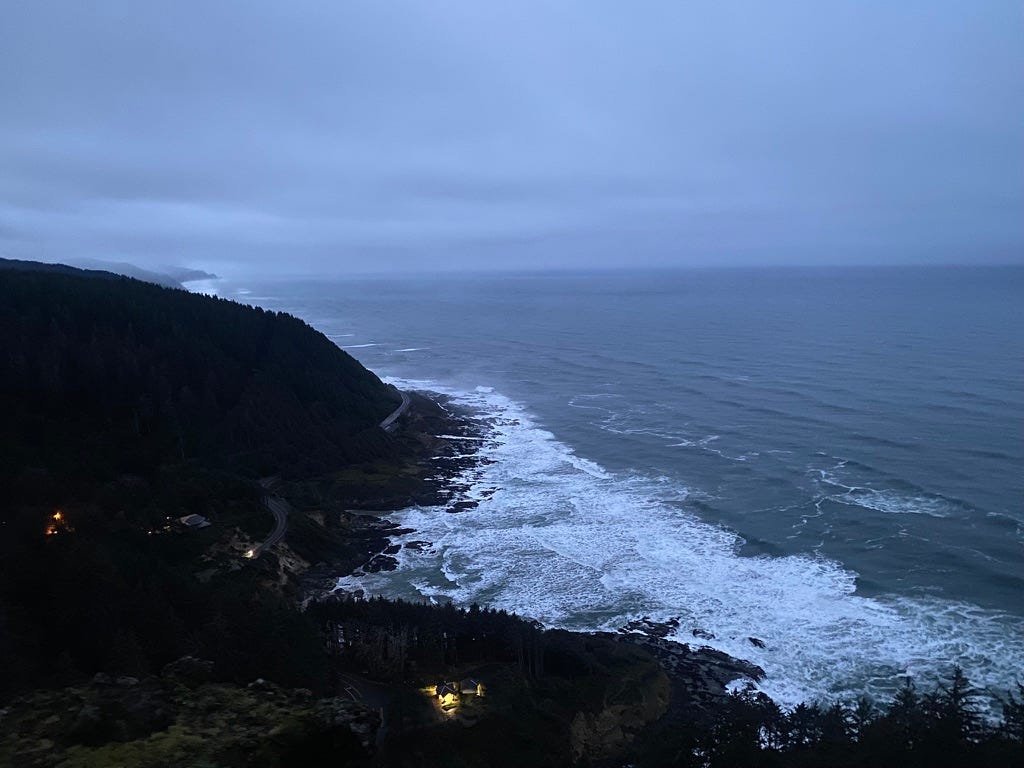The view from here.
“Those who cannot remember the past are condemned to repeat it.” – George Santayana, The Life of Reason, 1905.
So, optimism, optimism, optimism; ok, let’s see, what have we got?
Recently, Must Be Something got to do a fun project in Yachats, an adorable small town on the Oregon coast tucked into a landscape of epic natural splendor. In fact, while waiting for sunrise at the top of the Amanda Trail, we looked out at that vista, wooded slope plunging to rocky coast where great waves, in ranks that stretched as far as the eye could see, rolled in and spent themselves in spume and foam. We could not help but feel that this was singular beauty—yes, one understood there must be, elsewhere in the world, other beautiful places, but it was hard for the moment to imagine what they might be and impossible to prove, in one’s own mind, that this was not the most beautiful place in the world.
A perfectionist might wish the scene were entirely devoid of any signs of human life—the 101 snaked through the trees below us and here and there a roof suggested domesticity–and to us, that is part of the story and therefore part of the beauty. This continent has been shaped by human industry for thousands of years—who would wish to overlook such rich history?
Charles C. Mann, in his book 1491: New Revelations of The Americas Before Columbus, writes movingly of the white men slowly moving westward, two hundred years after Columbus, finding what they thought to be an unspoiled paradise, sparsely populated by natives, when what they were really discovering was a kind of crime scene where once a vibrant, populous community practiced land and forest management at grand scale. But European smallpox being that much faster than European men, it had wiped out whole communities generations before the explorers arrived in the wilderness they had, in part, created.
Nor did smallpox slow its march. It spread across the continent, killing close to 90% of the indigenous population. In fact, the original inhabitants of Yachats were entirely erased by smallpox. Neighboring tribes, like the Coos and Siletz, fared somewhat better, only to run afoul of the management practices of the U.S. Government, whose agents hunted, wrangled and marched the locals from one piece of land to another, uprooted and uprooted again, as the white settlers discovered a desire for this or that parcel that needed farming or logging or to be otherwise folded into our manifest destiny.
That sort of story is found all over the country, of course. In Lincoln County, the bad blood was strong enough that even recently, we’re told, tribemembers heading north or south would take the long detour out to Corvallis to avoid stepping foot in this town.
The Amanda Trail, where we stood, was built to acknowledge and memorialize this mistreatment in general and, in particular, the brutal forced march of a group of Coos Indians, including Amanda, an elderly, blind woman, separated from her daughter and driven on over the rocky terrain until, as an officer attached to the march wrote, Amanda "tore her feet horribly over these ragged rocks, leaving blood sufficient to track her by."
Recent efforts, spearheaded by some inspiring locals, have led to dialog between the town and tribes, increased understanding, some reconciliation. That story is too important and too nuanced for us to tackle here. Suffice it to say, it is a bright turn on a dark path; one hopes it is not a moment but rather a movement toward a more self-aware, compassionate way of thinking and acting.
It is hard to reconcile the dissonance of this country we love having such a long history of terrible abuse—singling out a people, declaring their difference to be inferiority, and using that judgment as a pretext for any sort of cruelty imaginable, never seeing that this cruelty to the imagined other is, in fact, a cruelty to ourselves, an injury we will be a long time recovering from.
Obviously, we as a country are well on our way to making this same error again, and on a grand scale. But—and here is where the optimism sneaks in—we as individuals are fully capable of doing better, being smarter and acting with more compassion than our leaders. In fact, the story of Yachats, with individuals reaching out to individuals, making connections and making progress that starts to spread through the community—well, it makes you re-realize what a leader actually is and rethink where they can best be found.
Know what you believe. Say it as often and as well as you can. And be relentless. After all, the cliff seems mighty but the waves ultimately get their way.





We agree with you whenever possible. And this is one of those times. We will endeavor to be like the water. Thank you, Grant!
Too much? We’re just taking the long view over here:) Thanks for the comment, btw. We think of you as one of the most relentless positive forces in the business!